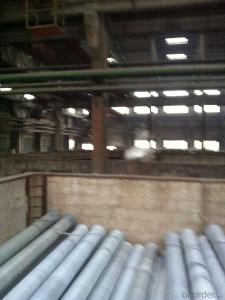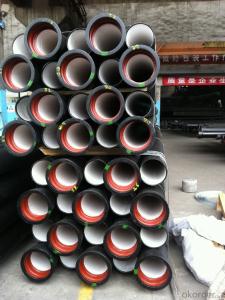DUCTILE IRON PIPES & FITTINGS K9 CLASS DN100
- Loading Port:
- Tianjin
- Payment Terms:
- TT OR LC
- Min Order Qty:
- 20 pc
- Supply Capability:
- 3000 pc/month
OKorder Service Pledge
OKorder Financial Service
You Might Also Like
Specifications
· Material : Ductile Cast Iron
· Size Range : DN 80mm to DN 2000mm
· Unit Effective Length : 6m or 5.7m
· Manufacture Standard: ISO 2531:1998/ EN 545:2006/EN 598:2007
· Annual capacity : 200,000 tons
· Coating Exterior: Zinc 130g/m2 according to ISO 8179-1 and bitumen coating 70 microns.
· Cement Interior: Portland Cement/ High Alumina Cement/ Sulphate Resisting Cement Lining according to ISO 4179
· Special requirements on external coating and internal lining can be applied
· We also provide accessories such as SBR/EPDM rubber gaskets, lubricant paste, pipe caps, PE sleeves, etc.
Additional Parts:
Each pipe is strictly inspected according to related standard to ensure permanently high performance.
Easy Installation at site and service free for life
Long Service Lifespan
Quotation will arrive you within 24hours once we get your inquiry.
We guarantee offering you a competitive price.
A copy of original inspection reports of pipes will be offered after shipment.
Photos of loading process will be sent to the customer after shipment effect.
We will follow-up the delivery progress after shipment effect and update to the customer on weekly basis.
- Q:Are ductile iron pipes suitable for potable water distribution systems?
- Yes, ductile iron pipes are suitable for potable water distribution systems. Ductile iron pipes have excellent corrosion resistance, high strength, and durability, making them a reliable choice for transporting drinking water. They are also widely used in water infrastructure due to their ability to withstand high pressures and external loads.
- Q:What is the expected external protection system for ductile iron pipes?
- The expected external protection system for ductile iron pipes typically involves a combination of protective coatings and cathodic protection.
- Q:What is the difference between cast iron pipe and seamless steel pipe and galvanized steel pipe?
- Cast iron pipe: cast pipe made of cast iron. Cast iron pipes are used for water supply, drainage and gas transmission lines. They include cast iron pipes and pipe fittings. Labor intensity is small. According to the casting method, it is divided into continuous cast iron pipe and centrifugal cast iron pipe, in which the centrifugal cast iron pipe is divided into sand mould and metal type two kinds. Divided into gray cast iron pipe and nodular cast iron pipe according to different material. According to the interface form, it is divided into flexible interface, flange interface, self anchored interface, rigid interface and so on. Among them, the flexible iron pipes rubber sealing ring; flange interface cast iron pipe flange fixed in the rubber pad, the flange gasket sealing; rigid interface cast iron pipe socket is large, straight pipe is inserted, sealed with cement, this technology has been basically eliminated.
- Q:What are the typical joint restraint requirements for ductile iron pipes?
- Ductile iron pipes typically require joint restraints to prevent separation or pulling apart. Two common types of restraints are mechanical joint restraints and push-on joint restraints. Mechanical joint restraints are used when the pipe faces high internal pressures or external loads. They consist of a gland and a follower gland that are tightened around the joint with bolts or clamps. This secures the joint and prevents movement. On the other hand, push-on joint restraints are used when the pipe doesn't face high pressures or loads. They provide a seal and prevent separation due to ground movement or external forces. Push-on joint restraints are installed by pushing the pipe into the joint and securing it with a ring or collar. In addition to joint restraints, proper bedding and backfill materials are important for ductile iron pipes. These materials help distribute loads and provide stability, further enhancing the pipe's resistance to joint separation. It's important to note that the specific joint restraint requirements may vary depending on project specifications, pipe size, and operating conditions. Therefore, consulting the manufacturer's recommendations and engineering standards is essential for selecting and installing the proper restraints.
- Q:What is the cost of ductile iron pipes compared to other pipe materials?
- The price of ductile iron pipes can vary depending on a variety of factors, including size, length, and supplier. However, when compared to materials like PVC or steel, ductile iron pipes generally tend to be more expensive. This is primarily due to the manufacturing process and the inherent qualities of ductile iron that make it a durable and dependable choice for various applications. Ductile iron pipes are renowned for their high tensile strength, resistance to corrosion, and durability. These qualities make them suitable for transporting potable water, wastewater, and other fluids under high pressure. The production process for ductile iron involves the addition of magnesium to cast iron, resulting in improved strength and flexibility. This additional step, combined with the quality of the material, contributes to the higher cost. On the other hand, pipes made from materials such as PVC or steel can be less costly. PVC pipes are lightweight, easy to install, and relatively inexpensive, making them a popular choice for low-pressure applications like irrigation or drainage systems. Steel pipes, known for their strength and durability, are often used in high-pressure situations but come with a higher price tag than PVC. In the end, while ductile iron pipes may have a higher initial cost, their longer lifespan and reliability can make up for the investment over time. Other factors, such as project requirements, local regulations, and material availability, can also impact the overall cost comparison between ductile iron pipes and other pipe materials.
- Q:How does ductile iron pipe perform in areas with high groundwater salinity?
- Ductile iron pipe performs well in areas with high groundwater salinity due to its inherent corrosion resistance properties. The high levels of salinity in the groundwater can cause corrosion and deterioration of certain materials, but ductile iron is highly resistant to this type of corrosion. Its composition and manufacturing process make it less susceptible to damage from corrosive elements, such as salt and minerals present in high salinity water. The corrosion resistance of ductile iron pipe is primarily attributed to its protective iron oxide coating, which forms naturally on the interior and exterior surfaces of the pipe. This coating acts as a barrier, preventing direct contact between the pipe and the corrosive elements in the groundwater. Additionally, ductile iron pipes are often lined with cement mortar or a protective epoxy coating, which further enhances their resistance to corrosion and provides an additional layer of protection. Furthermore, ductile iron pipe has a long lifespan, often exceeding 100 years, which makes it ideal for areas with high groundwater salinity. Its durability and resistance to corrosion ensure that it can withstand the harsh conditions associated with high salinity environments, minimizing the need for frequent repairs or replacements. In summary, ductile iron pipe is an excellent choice for areas with high groundwater salinity due to its corrosion resistance properties. Its protective iron oxide coating, coupled with optional linings, provides a reliable and long-lasting solution, ensuring the integrity and performance of the pipe system even in challenging environments.
- Q:Are ductile iron pipes resistant to biological growth?
- Yes, ductile iron pipes are generally resistant to biological growth. The smooth interior surface of ductile iron pipes prevents the buildup of biofilm and inhibits the growth of bacteria and other organisms. Additionally, the material itself is not conducive to the growth of biological contaminants, making ductile iron pipes a reliable choice for water and wastewater applications.
- Q:What are the common causes of failure in ductile iron pipes?
- There are several common causes of failure in ductile iron pipes. One major cause is corrosion. Over time, the exposure to water, soil, and other environmental factors can lead to the formation of rust and corrosion on the pipe's surface. This can weaken the structural integrity of the pipe and eventually lead to failure. Another common cause is improper installation or handling. If the pipes are not installed correctly or if they are mishandled during transportation or installation, it can result in cracks, fractures, or other physical damage. These defects can compromise the functionality of the pipe and contribute to its failure. Inadequate design is another factor that can lead to failure. If the pipe is not designed to withstand the anticipated loads, pressures, or environmental conditions, it can become susceptible to premature failure. The pipe's material properties, wall thickness, and diameter must be carefully considered during the design process to ensure it can handle the expected demands. Poor maintenance and lack of timely repairs can also contribute to failure. Regular inspections, maintenance, and prompt repairs are necessary to identify and address any issues before they escalate. Failure to do so can result in the gradual deterioration of the pipe, making it more prone to failure. Lastly, external factors such as soil movement, seismic activity, or excessive traffic loads can also cause failure in ductile iron pipes. These external forces can exert stress on the pipe, leading to cracks, fractures, or even complete failure. To prevent failure in ductile iron pipes, it is essential to employ proper corrosion protection techniques, follow correct installation procedures, ensure adequate design considerations, implement regular maintenance and repair programs, and account for external factors during the planning and installation process.
- Q:How can the connection of ductile iron pipe elbow be convenient for connecting?
- The groove connecting pipe consists of two categories of products: sealing function of pipe connections with rigid joint, flexible joint, mechanical three and groove flange; the pipe connections transition of elbow, three links, four links, different diameter pipe, blind plate etc..
- Q:Can ductile iron pipes be used for road and highway drainage?
- Yes, ductile iron pipes can be used for road and highway drainage. Ductile iron pipes have excellent strength and durability, making them suitable for handling the heavy loads and traffic associated with road and highway drainage systems. Additionally, they have high resistance to corrosion and provide a smooth internal surface, minimizing the chances of blockages and ensuring efficient water flow.
1. Manufacturer Overview |
|
|---|---|
| Location | |
| Year Established | |
| Annual Output Value | |
| Main Markets | |
| Company Certifications | |
2. Manufacturer Certificates |
|
|---|---|
| a) Certification Name | |
| Range | |
| Reference | |
| Validity Period | |
3. Manufacturer Capability |
|
|---|---|
| a)Trade Capacity | |
| Nearest Port | |
| Export Percentage | |
| No.of Employees in Trade Department | |
| Language Spoken: | |
| b)Factory Information | |
| Factory Size: | |
| No. of Production Lines | |
| Contract Manufacturing | |
| Product Price Range | |
Send your message to us
DUCTILE IRON PIPES & FITTINGS K9 CLASS DN100
- Loading Port:
- Tianjin
- Payment Terms:
- TT OR LC
- Min Order Qty:
- 20 pc
- Supply Capability:
- 3000 pc/month
OKorder Service Pledge
OKorder Financial Service
Similar products
New products
Hot products
Related keywords



























